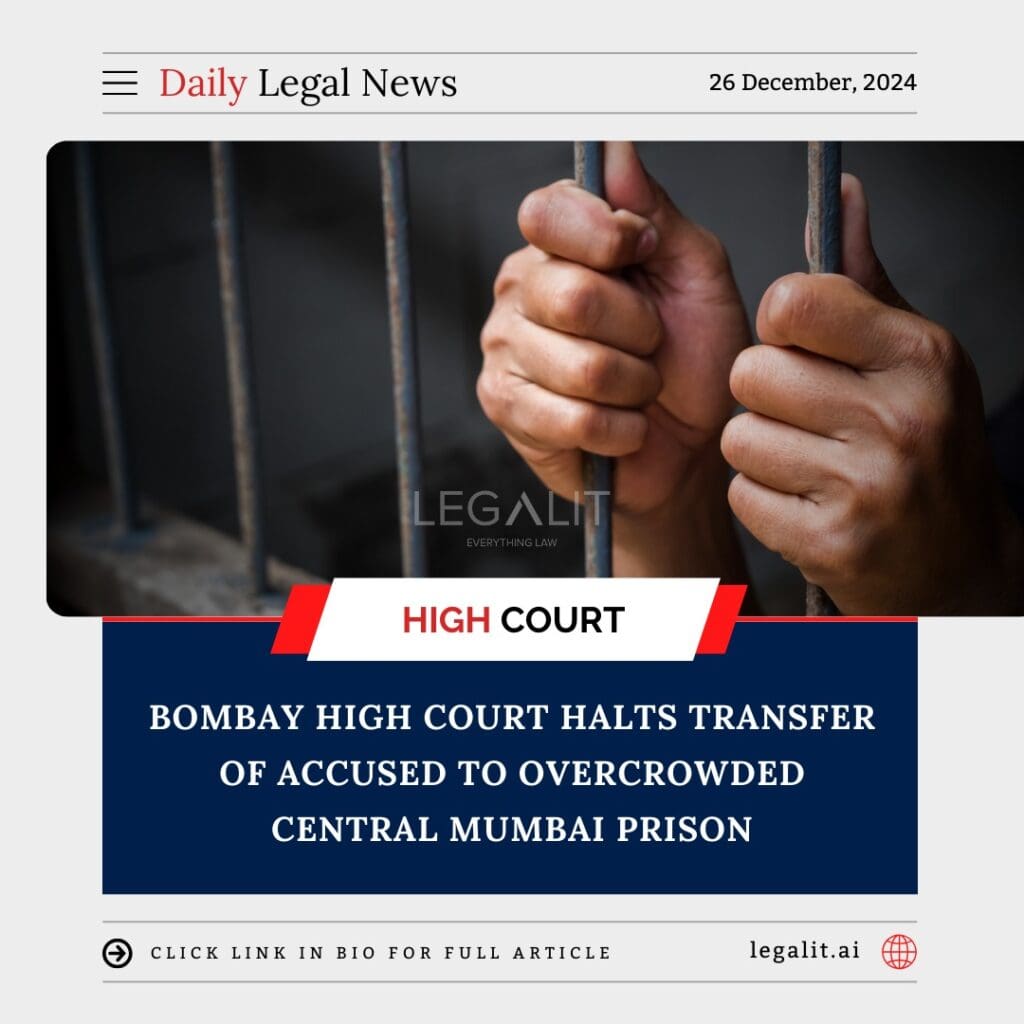
In a significant legal development, the Bombay High Court has temporarily stayed the transfer of an accused individual to the overcrowded Central Mumbai Prison, raising concerns over the adverse conditions within the facility. The court’s intervention came in response to a petition filed by the accused, who argued that the transfer would expose him to inhumane conditions, potentially violating his fundamental rights.
Background
The Central Mumbai Prison, known for its severely overcrowded conditions, has long been a subject of concern among human rights advocates and legal experts. Prisons across the country, including the one in question, have been facing issues related to inadequate infrastructure, lack of proper facilities, and cramped living spaces.
In this case, the accused, currently in custody for charges related to a criminal offense, was scheduled to be transferred to the Central Mumbai Prison. His legal team filed a petition highlighting the overcrowded nature of the prison, raising concerns about the impact it would have on his physical and mental well-being. They argued that the prison, already operating beyond its capacity, could not provide the necessary conditions for a fair and just trial.
The petition emphasized that the accused’s right to dignity and humane treatment under Article 21 of the Indian Constitution would be violated by such a transfer.
Key Arguments
Petitioner’s Concerns
- Overcrowded Conditions: The petition argued that the Central Mumbai Prison is already overcrowded, with the number of inmates far exceeding its capacity. Such conditions could lead to a lack of personal space, inadequate sanitation, and potential health risks.
- Violation of Fundamental Rights: The accused’s legal team pointed out that transferring him to such a facility would infringe upon his right to a safe and dignified life, as enshrined in Article 21 of the Constitution.
- Health and Safety Risks: The overcrowded conditions could also lead to the spread of diseases, further endangering the health of the accused and other inmates.
Government’s Defense
- Prison Capacity Issues: The government may argue that overcrowding in prisons is a systemic issue, with many facilities operating beyond their capacity. However, it could also emphasize efforts being made to address the problem, such as constructing new facilities and increasing staff capacity.
- Public Interest: The state could also argue that the transfer of the accused is necessary for the efficient management of the legal process, ensuring that the accused is held in custody as per the court’s directions.
Court’s Observations and Ruling
- Interim Stay on Transfer: The Bombay High Court, after hearing the arguments, decided to stay the transfer of the accused to the Central Mumbai Prison. The court noted the serious concerns raised regarding the overcrowded conditions and the potential violation of the accused’s fundamental rights.
- Need for Adequate Facilities: The court directed the authorities to provide an alternative facility that would ensure the accused’s rights are upheld, maintaining a balance between security and humane conditions.
- Further Investigation: The court also ordered the state government to investigate the situation at the Central Mumbai Prison and explore measures to alleviate overcrowding, such as constructing new facilities or improving existing infrastructure.
Legal and Policy Implications
Protection of Prisoners’ Rights
This case underscores the importance of safeguarding prisoners’ rights to humane treatment, especially in overcrowded and underfunded prison systems. The court’s intervention sends a strong message that the rights of individuals cannot be compromised, even while ensuring that justice is served.
Addressing Overcrowding in Prisons
The ruling also draws attention to the growing issue of overcrowded prisons in India. The state may now be forced to reconsider its approach to managing prison populations, exploring alternatives like decongestion strategies, better prison infrastructure, or alternatives to imprisonment for non-violent offenses.
Precedent for Future Cases
This decision could set a precedent for future cases where prisoners challenge overcrowded conditions or seek better treatment while in custody. It may encourage further legal scrutiny into the conditions of prisons, prompting authorities to take corrective actions.
Conclusion
The Bombay High Court’s stay on the transfer of an accused individual to the overcrowded Central Mumbai Prison highlights the ongoing challenges faced by the Indian prison system. By intervening in this case, the court has reinforced the importance of protecting the fundamental rights of prisoners, even within the confines of legal custody. The decision serves as a reminder that the state must ensure humane conditions for all individuals, including those incarcerated, and it is likely to influence future decisions concerning prison conditions across India.